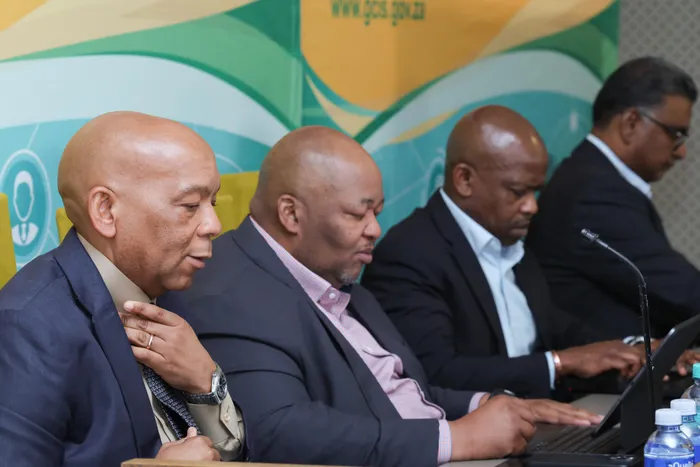
Minister for Electricity and Energy, Kgosientso Ramakgopa and Eskom CEO Dan Marokane during the media briefing on the State of the National Grid on Wednesday.
Image: GCIS
Banele Ginidza
Minister for Electricity and Energy, Kgosientso Ramakgopa, has urged Eskom to withdraw its ongoing court challenge against the Energy Regulator of South Africa (Nersa) regarding the awarding of electricity trading licences to private companies.
This appeal comes as Ramokgopa emphasised the need for a regulatory environment that fosters competition rather than legal disputes.
Ramakgopa's remarks highlight a growing divide amongst business stakeholders.
While some, such as Business Leadership South Africa (BLSA) and Business Unity South Africa (BUSA), have been vocal critics of Eskom's decision to litigate, the South African Local Government Association (SALGA) has sided with the utility.
In response to the pushback, Ramakgopa advised Eskom, "not to burden the judges to come into this domain," underscoring his belief that court intervention would complicate an already intricate sector.
"Nersa then initiated the process of reviewing and coming up with the rules. The initial timeline was that they will do that within 12 months. I asked Nersa that the pressure is such that we need to conclude those rules as soon as possible," Ramokgopa said during a media briefing on Wednesday.
"And Nersa has agreed that we'll truncate that to three months without compromising the quality of the impact and what the rules will look like. And in that context, I said to Eskom it's not advisable that you go to the courts. And with the highest respect we have with the judiciary, don't invite the judiciary into a space that is really technical, if you like."
However, Ramokgopa acknowledged that introducing competition in this nascent market could be precarious.
He explained that the market's current conditions might lead to a dilemma where private entities, driven primarily by profit motives, tend to serve only the higher ends of the market, thus neglecting poorer consumers and potentially decimating local municipalities as they lose their customer base.
"Because this is a nascent space we are starting, none of us have been in this space before. There's naturally going to be friction, interpretation, misinterpretation of what this reform means," he said.
"There's going to be conversations and, in some instances, disagreement on the pace of these reforms. The issue whether the regulator is capacitated enough to be able to manage and oversee these reforms.
"Is this monopoly that is Eskom ready to relinquish that monopoly and accept that they are new players? And what the Eskom team had raised was that we are not opposed to the reforms, but what we want is clarity with regards to the rules."
Ramakgopa said what the SA Local Government Association was saying was that what this dispensation does was that munnicipalities were going to lose their best customers who underpin and guarantee them the revenue stream, and they will be left with those that can't afford.
"So that's the argument," he said, adding that whether Eskom and its board took that decision was outside of the entity's scope.
"I've raised it with the chair. Don't enter the court process. Let's not muddy the space. We have agreed, next time doing that, the shareholder will also oversee the process," Ramokgopa said.
"It's a particularly unhelpful approach to muddy the waters. Allow the space and for us as the players, there's friction. And in that period, the expectation is that let's clear the rules. And then once we have cleared the rules, then proceed with the issuing of the license.
"I have raised that to the chair and its something that they will go back and ensure that we are able to address it. I have no answer now whether they have initiated it or not, the conversation took place yesterday."
BUSINESS REPORT